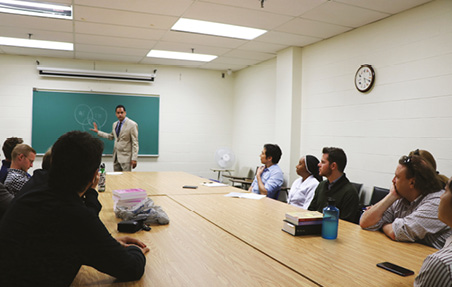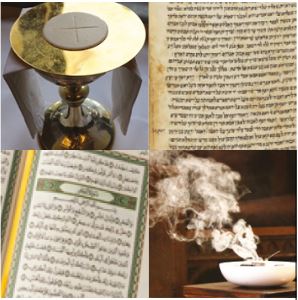Faculty of Theology Looks to Future

It’s an exciting time for St. Michael’s Faculty of Theology. The coming months promise many developments for the Faculty, including a revitalized Elliott Allen Institute for Theology and Ecology, a new scholar in the Patrick and Barbara Keenan Chair in Religious Education, and the possibility of an alliance with Regis College, the Jesuit theologate just a block away.
“We are excited to be renewing our focus on Catholic education, ecotheology, and feminist theology, all areas we have long been known for,” says Dr. John L. McLaughlin, the Faculty’s Interim Dean. “At the same time, we are pleased with the progress of recent additions, such as our Diploma in Interfaith Dialogue, and especially the support we are receiving from the Archdiocese’s Office for Interreligious Dialogue.”
The talks between Regis and St. Mike’s are just one of many examples of how the Faculty is thinking creatively to best serve not only its students but also the community and the church, McLaughlin explains.
“A closer alliance with Regis would allow us to be more systematic in our course offerings by avoiding duplication and increasing the choices we can offer. Regis and St. Mike’s complement each other,” he says. “There are many other benefits to consider, including the presence of Jesuit seminarians, who could assist in campus ministry.”
As the Faculty looks to the future, it wants to build on its long-standing reputation for delivering a solid theological base while also considering modern challenges. The course catalogue reflects that, with recent and coming course offerings ranging from a close look at Laudato si’ on the clergy abuse scandal in the Church through to topics such as the #BlackLivesMatter movement.

Theology matters because it has the capacity to cultivate empathy. Empathy is almost embodied in the experience of theological education. Whether it is in an ecumenical context or an interreligious one, you come face to face with the ‘the other’ and learn very quickly the importance of putting yourself in someone else’s shoes, particularly as it concerns the oppressed and marginalized.
Doctoral student Mia Theocaris, whose dissertation will examine Christianity and the Holocaust
“We know our students are out in the world, teaching and ministering—whether in academia, or parish ministry or chaplaincy, and we want them to be equipped with a solid grounding in theology, as well as an understanding of how to apply that knowledge to the present day,” McLaughlin notes.
All this takes place while Faculty members continue to publish and research, as well as serve the academy and the community through a variety of appointments. Sr. Anne Anderson, Dr. Darren Dias, Dr. Michael Attridge, and Dr. J. P. Fortin serve on the Canadian Catholic Bishops’ Interreligious Dialogue panels, for example, while McLaughlin recently completed a leadership stint with the Canadian Society of Biblical Studies and continues editorial roles at various academic publications. And, notes McLaughlin, he and his colleagues continue to connect via conferences such as the recent, USMC-wide conference on “The Role of a Catholic University in the 21st Century.”
“We have an impressive track record on conferences,” he says, smiling. “Just days after we hosted our conference on Women and the Diaconate in May 2016, Pope Francis announced he was opening up discussions on the topic. We really understand where the church is and where it wants and needs to be.”
103
Students enrolled
33
Graduate students
59
Basic degree students
I
Diploma/non-degree student
$488,500
Amount of total financial aid for Faculty of Theology students—basic and advanced degree, domestic and international students in the 2020–2021 academic year
Diploma in Interfaith Dialogue
This fall will see the first cohort graduate from St. Michael’s Diploma in Interfaith Dialogue, a program designed to encourage meaningful dialogue among people of various faith traditions.
The diploma, which is open to all, regardless of post-secondary qualifications, consists of 10 courses
and is subsidized by a generous donation from the Scarboro Missions.
“The diploma is a great example of how we can make a positive difference, especially in an area as diverse as the Greater Toronto Area,” says Interim Dean John L. McLaughlin.
“We as Catholics are called to learn about our brothers and sisters of differing faiths,” says program participant Marilyn Grace. “I strongly urge anyone interested in growing and learning about other faith traditions to enrol in this informative
and challenging program.”

““We as Catholics are called to learn about our brothers and sisters of differing faiths. I strongly urge anyone interested in growing and learning about other faith traditions to enrol in this informative and challenging program.”
Marilyn Grace,
Diploma program participant

